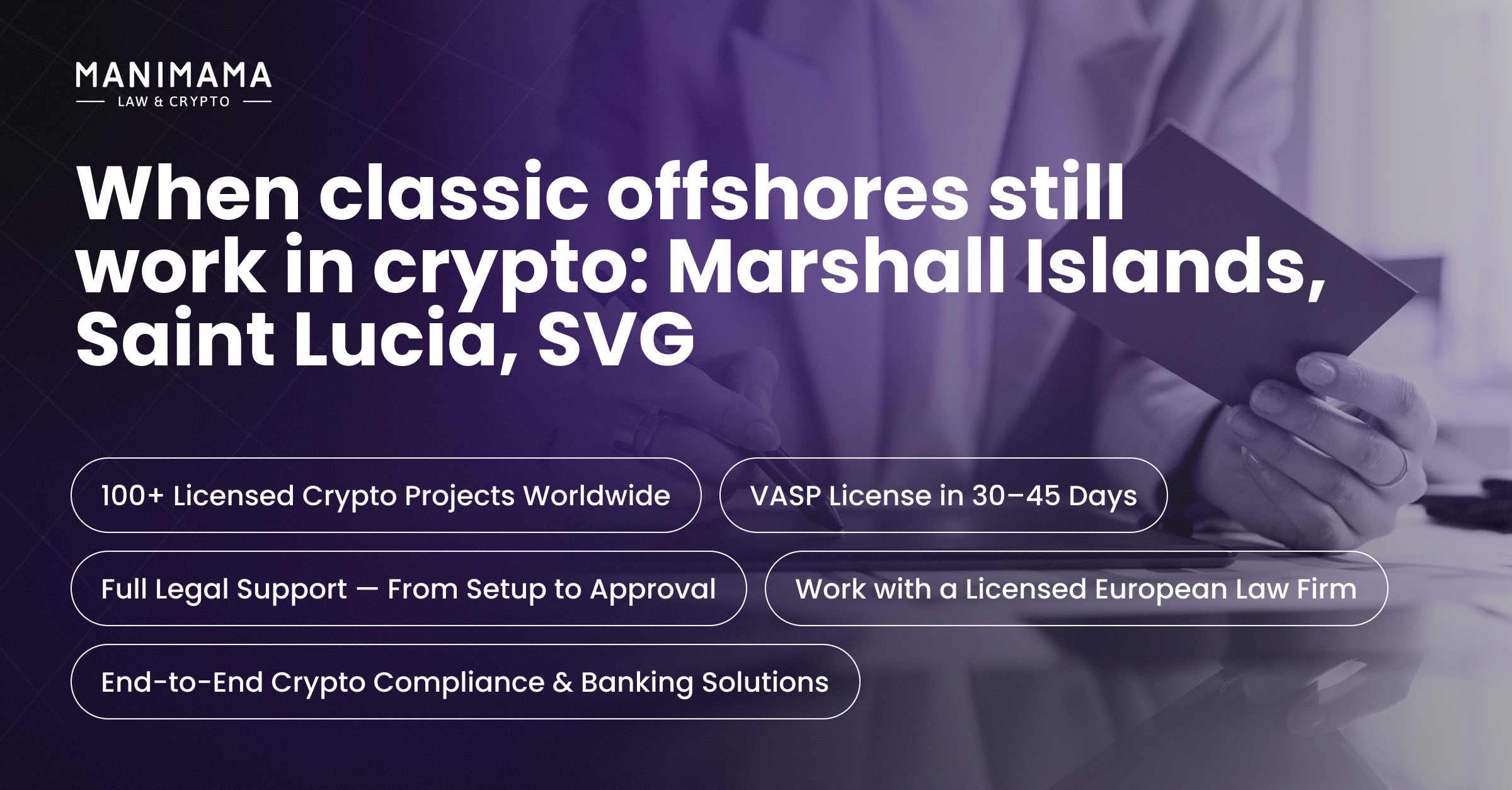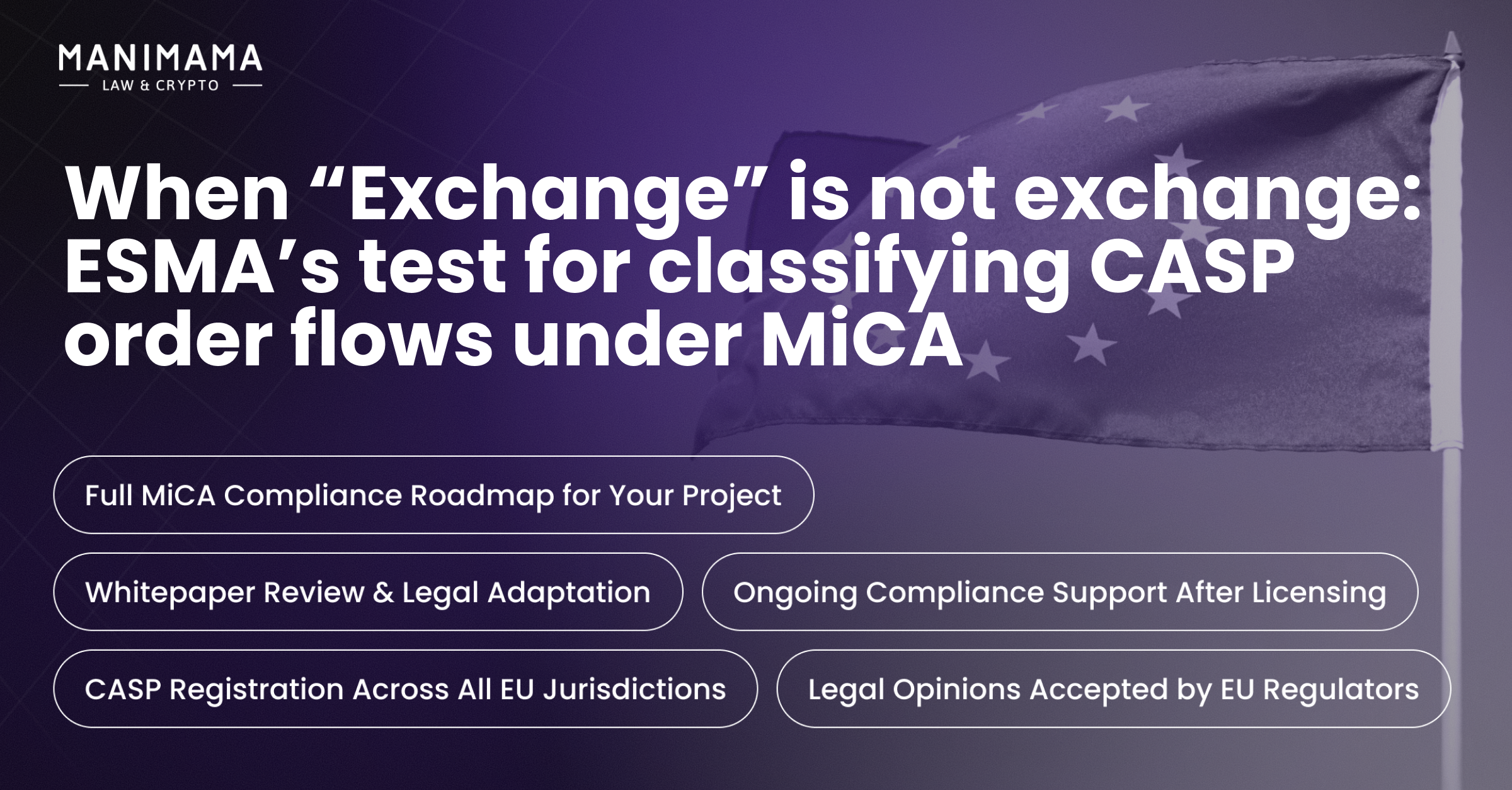The Markets in Crypto-Assets Regulation (MiCA) introduces a unified regulatory framework for crypto-assets across the European Union (EU), promoting legal certainty, investor protection, and market stability. One of the core requirements under MiCA is obtaining a Crypto-Asset Service Provider (CASP) license, mandatory for businesses offering crypto asset services.
This licensing ensures compliance with strict standards on governance, security, and anti-money laundering (AML), enabling licensed CASPs to operate seamlessly across all EU member states. Whether you are an emerging startup or an established operator, obtaining a CASP license is essential to access the EU’s vast and dynamic market for digital assets.
In Poland, the Financial Supervision Commission (Komisji Nadzoru Finansowego / KNF) will be the competent authority overseeing CASP licensing under MiCA (according to the latest version of the bill implementing MiCA). Businesses operating or planning to provide crypto-asset services in Poland must adhere to local implementation requirements alongside MiCA’s EU-wide provisions.
Our firm has a thorough knowledge of Polish law, ensuring that your compliance efforts are efficient and effective.
We can help your business meet compliance requirements and unlock the potential of the EU crypto market!
In Poland, the KNF will be the competent authority overseeing CASP licensing under MiCA
Key Numbers about a CASP License in Poland
3 months average term of obtaining CASP license after application submission | €50,000 - €150,000 amount of the share capital depending from CASP activity | at least several directors in a CASP |
19% corporate income tax (CIT) rate | 12/32% personal income tax (PIT) rate | 19% capital gains tax (CGT) rate |
Legal Opinion about a CASP License in Poland

Ganna Voievodina
Manimama
|
CEO
“Obtaining a CASP license in Poland is essential for businesses offering crypto-asset services. Applicants must meet requirements, including robust AML/CFT compliance, a formal governance structure, and sufficient operational capital. Once licensed, CASPs must adhere to ongoing reporting obligations and maintain compliance with Polish and EU regulations. A CASP license enhances credibility and provides access to the EU market under a clear regulatory framework”.



Types of Activities with a CASP License in Poland
Providing custody and administration of crypto-assets on behalf of clients
This service means safekeeping or controlling, on behalf of third parties, crypto-assets or the means of access to such crypto-assets, where applicable in the form of private cryptographic keys. Holdings of crypto-assets on behalf of the clients shall be segregated from CASP’s holdings.
Operation of a trading platform for crypto-assets
This service contains of the management of one or more multilateral systems, which brings together or facilitates the bringing together of multiple third-party buying and selling interests for crypto-assets – in the system and in accordance with its rules – in a way that results in a contract, either by exchanging one crypto-asset for another, or a crypto-asset for funds.
Exchange of crypto-assets for funds
This service means the conclusion of purchase or sale contracts concerning crypto-assets with clients for funds by using proprietary capital.
Exchange of crypto-assets for other crypto-assets
This service means the conclusion of purchase or sale contracts concerning crypto-assets with clients for other crypto-assets by using proprietary capital.
Execution of orders for crypto-assets on behalf of clients
This service means concluding agreements to buy or to sell one or more crypto-assets or to subscribe for one or more crypto-assets on behalf of third parties and includes the conclusion of agreements to sell crypto-assets at the moment of their issuance.
Placing of crypto-assets
This service includes the marketing, on behalf of or for the account of the offeror or of a party related to the offeror, of crypto-assets to purchasers. Before placing the crypto-assets a CASP shall obtain the agreement of the issuers or any third party acting on their behalf.
Reception and transmission of orders for crypto-assets on behalf of clients
This service means the reception from a person of an order to buy or to sell one or more crypto-assets or to subscribe for one or more crypto-assets and the transmission of that order to a third party for execution.
Providing advice on crypto-assets
This service means offering, giving or agreeing to give personalized recommendations to a third party, either at the third party’s request or on the initiative of the a CASP providing the advice, in respect of one or more transactions relating to crypto-assets, or the use of crypto-asset services.
Providing portfolio management on crypto-assets
This service includes managing portfolios in accordance with mandates given by clients on a discretionary client-by-client basis where such portfolios include one or more crypto-assets.
Providing transfer services for crypto-assets on behalf of clients
This service means transfer, on behalf of a natural or legal person, crypto-assets from one distributed ledger address or account to another. Such service may be provided without virtual currency wallet opened for a CASP’s client.
Benefits of Obtaining a CASP License in Poland
Legitimacy in the Polish market:
- A CASP license establishes legal recognition for your operations within Poland.
- It allows you to gain trust among Polish clients, businesses, and investors by showcasing compliance with local regulations.
Participation in government initiatives:
- Licensed CASPs can take part in government-backed programs that support digital transformation in Poland.
- Such programs often include funding, networking, and growth opportunities.
Access to innovation hubs and clusters:
- Poland hosts several innovation hubs and crypto-friendly tech parks, such as those in Warsaw and Kraków.
- Licensing enhances eligibility to operate within these ecosystems.
Access to a skilled workforce:
- Poland is home to a highly educated and tech-savvy workforce, particularly in blockchain and crypto development.
- A license ensures credibility to attract top talent for your operations in Poland.
EU-wide passporting under MiCA:
- CASPs are able to offer services across the EU without additional licensing.
- This enables companies to expand into 27 EU countries seamlessly.
Stable economic environment:
- Poland’s growing economy and stable political climate make it a reliable jurisdiction for CASPs.
- Licensing aligns your business with one of the most resilient economies in the EU.
Our services
STEP 1
Incorporation stage
- Company formation in Poland
- Provision of a registered address for 1 year
- Opening corporate bank account and transferring the share capital
- Appointment and employment of a local director
- Detailed company structure documentation
STEP 2
Pre-licensing stage
- Preparation and submission legal and financial documents (non-exhaustive list) according to MiCA
- Review of existing policies and procedures, if the company already has them
STEP 3
Licensing stage
- CASP license application assistance
- Conducting communication with the KNF during the license process

CEO, co-founder


Step by step description
Initial setup
- Initiating a preliminary project assessment
- Creating an action plan
- Preparation and filing of the package of documents
Company registration
- Choosing a preferred company name
- Opening a company account for the formation of authorized capital
- Applying for company registration via the S24 system (must be accompanied by a complete set of self-prepared attachments in PDF format, namely: company's articles of association, declaration of shareholders, declaration of the contribution of share capital, declaration that the company is managed by foreigners, declaration of communication, and the application itself)
- Entry of company data into the Polish Company Register (The National Court Register - KRS)
- Registration for tax purposes
Obtaining a CASP license
- Preparation of documents according to MICA
- Submission an application to the licensing authority - KNF
- Reviewing the application to ensure it is complete (if any documents or information are missing, the applicant will be notified and given a specific deadline to provide the necessary additional documentation)
- Assessment of the documents` content submitted (a detailed review to verify that all regulatory requirements are met)
- Requesting of additional details (if applicable)
- Notification of grant or refusal of the CASP license
- Granting or refusal notification to European Securities and Markets Authority (ESMA)
- Publication in ESMA register

National Legislation of Poland
In Poland, the transition period means that applicants may continue to provide services related to the provision of crypto-asset services until July 1, 2026
Regulation:
The key Polish instrument for implementing MiCA is currently a draft Ustawa o rynku kryptoaktywów (Act on the crypto-assets market / Act). The bill has not yet been enacted and remains a legislative proposal. Its purpose is to align Polish law with the EU MiCA framework and provide for effective supervision and investor protection in the crypto-assets sector.
Licensing authority:
According to the bill, the primary regulator responsible for enforcing MiCA in Poland will be the Komisja Nadzoru Finansowego (KNF). The bill grants KNF the necessary tools to effectively supervise the crypto-assets market and enforce compliance with MiCA provisions. Particularly, the KNF will oversee the registration of CASPs operating in Poland and ensure they adhere to transparency, risk management, and consumer protection rules.
Procedure, timelines, fees:
Following the full application of MiCA, i.e. after 30 December 2024, the KNF must assess within 25 working days of receiving an application for authorisation whether all of the required information has been included in the application. At this stage, however, the KNF will not assess the quality of the information provided. The KNF may ask the applicant to supplement the application if some or all of the required information is missing. The KNF will set a deadline for the submission of any missing information. After the submission of missing information, the KNF will have 40 working days to make a qualitative assessment of the application. During this period, the KNF has the opportunity to submit additional requests for clarification, but only the first of these requests will suspend the 40 working day assessment period, for a maximum of 20 working days.
Pursuant to Art. 77 of the bill, a fee of no more than the equivalent in PLN of the amount of €4,500 will be payable for the granting of the CASP license.
In accordance with Art. 78 of the bill, each CASP will be required to make an annual supervisory contribution based on the average total revenue over the preceding three financial years, at a rate not exceeding 0.4%, and no less than the PLN equivalent of €500. Revenue includes income from the provision of crypto-asset services and profit from trading crypto-assets, and also includes financial and other core income.
Transition period:
As stated in the bill, from the day the new law takes effect until the firm either receives a permit or is refused one, any entity that is already listed in the register of virtual-currency activities on that day may continue providing the services it was allowed to offer under the previous rules and conditions. This transitional permission ends no later than July 1, 2026, or earlier if the entity is removed from the register.
Requirements for Obtaining a CASP License in Poland
Capital requirements for a CASP vary depending on what services the company will provide - from €50,000 to €150,000
Physical office requirements
A CASP shall have a registered office in Poland where it carries out at least part of their crypto-asset services.
Requirements for key persons
Senior managers (directors):
- Number: MICA does not specify a minimum and maximum number of directors. However, MICA states (part 2, article 59) that there shall be at least several directors.
- Residency requirements: At least one director must be an EU resident.
- General requirements: Directories must have a solid reputation, necessary skills, and relevant experience.
- Required documents:
- a clean criminal record
- a detailed CV
- statements on time commitment and past professional conduct
Shareholders:
- Number: MICA does not specify a minimum and maximum number of shareholders.
- Residency requirements: There is no restriction.
- General requirements: Shareholders must have a solid reputation, necessary skills, and relevant experience.
- Required documents:
- a clean criminal record
- an ownership structure chart
Capital requirements
Capital requirements vary depending on what services the company will provide:
Class 1: A CASP authorized for the following crypto-asset services:
- execution of orders on behalf of clients
- placing of crypto-assets
- providing transfer services for crypto-assets on behalf of clients
- reception and transmission of orders for crypto-assets on behalf of clients
- providing advice on crypto-assets and/or
- providing portfolio management on crypto-assets
Minimum capital requirements - €50,000.
Class 2: A CASP authorized for any crypto-asset services under Class 1 and:
- providing custody and administration of crypto-assets on behalf of clients
- exchange of crypto-assets for funds and/or
- exchange of crypto-assets for other crypto-assets
Minimum capital requirements - €125,000.
Class 3: A CASP authorized for any crypto-asset services under Class 2 and:
- operation of a trading platform for crypto-assets.
Minimum capital requirements - €150,000.
Documentation requirements
There are list of documents that must be submitted with the application:
Documents required for all CASPs:
- The articles of association of the applicant CASP
- Identity and proof of good repute, knowledge, skills, experience and of sufficient time commitment of the members of the management body
- Information relating to shareholders or members with qualifying holdings
- A program of operations setting out the types of crypto-asset services that the applicant CASP wishes to provide, including where and how these services are to be marketed
- A description of the applicant CASP’s prudential safeguards (insurance policy)
- A description of the applicant CASP’s governance arrangements and internal control mechanisms
- A description of the applicant CASP’s business continuity plan
- Detection and prevention of money laundering and terrorist financing (full packet of policies)
- Descriptions both in technical and non-technical language of applicant CASP’s IT systems and security arrangements
- A description of the applicant CASP’s procedures to handle complaints from clients
Documents required in case CASP wishes to offer services in other countries:
- List of EU countries where the company wishes to offer its services
Documents required for certain services (each of the 10 services requires its own documents):
- Custody and administration policy
- A description of the procedure for the segregation of client’s crypto-assets and fund
- The operating rules of the trading platform and market abuse detection
- Information on the exchange of crypto-assets for funds or other crypto-assets (commercial policy)
- The execution policy
- Information on the provision of advice or portfolio management on crypto-assets
- Information on transfer services
Taxes in Poland
The CIT rate is 19% for most of companies
Corporate Income Tax (CIT)
The standard rate is 19%.
A reduced rate of 9% applies to small taxpayers and new companies in their first year of business activity, provided certain conditions are met. To qualify as a small taxpayer, a company's revenue, including applicable VAT, must not exceed EUR 2 million.
If a company's activities relate to intellectual property, income from such activities may be taxed at the rate of 5%.
Companies that do not pay dividends and reinvest profits do not need to pay income tax (i.e. 0% tax) if they fulfill specific criteria. This is the so called Estonian CIT, which you can take advantage of if, for example:
- you are not a credit or financial institution
- your shareholders are individuals only
- you derive your income mainly from activities (not from passive income)
- you have filed a notification with the competent tax authority
- you do not operate in a special economic zone
- you employ more than 3 full-time employees
- you do not prepare financial statements in accordance with IFRS
Companies engaging in buying and selling of crypto assets are subject to a 19% income tax on interest generated by the disposal of cryptocurrencies.
Capital Gains Tax (CGT)
There is no separate capital gains tax.
Capital gains are generally taxed at the standard CIT rate of 19%.
Personal Income Tax (PIT)
Individuals who are residents for tax purposes in Poland are taxable on their worldwide income.
The tax rates are:
- annual taxable income up to PLN 120,000 (approx. €28,000) is taxed at 12%
- annual taxable income above PLN 120,000 (approx. €28,000) is PLN 10,800 + 32%
Frequently asked questions
What is a CASP license in Poland?
A CASP license is a regulatory authorization required for companies providing cryptocurrency-related services such as exchanges, custodial services, advisory services, etc. in Poland.Who issues the CASP license in Poland?
The KNF will issue CASP licenses.What services can be provided under a CASP license?
It allows services such as:
- 1) Providing custody and administration of crypto-assets on behalf of clients
- 2) Operation of a trading platform for crypto-assets
- 3) Exchange of crypto-assets for funds
- 4) Exchange of crypto-assets for other crypto-assets
- 5) Execution of orders for crypto-assets on behalf of clients
- 6) Placing of crypto-assets
- 7) Reception and transmission of orders for crypto-assets on behalf of clients
- 8) Providing advice on crypto-assets
- 9) Providing portfolio management on crypto-assets
- 10) Providing transfer services for crypto-assets on behalf of clients
What are the key requirements to obtain a CASP license in Poland?
Companies must meet physical office requirements, requirements for managers and shareholders, minimum capital requirements, documentation requirements.Is it mandatory to have a physical office in Poland to obtain a CASP license?
Yes, a local office in Poland is required for regulatory oversight.Is there a minimum capital requirement for obtaining a CASP license
Yes, applicants must meet specific financial and operational adequacy standards, but the exact minimum capital depends on the services offered (€50,000, €125,000, €150,000).What is the process for applying for a CASP license?
The process will involve submitting an application to the KNF with detailed documentation on the company structure, management, AML policies, and financial plans, etc.How long does it take to obtain a CASP license?
The preparation of documents and the review process typically takes several months, depending on the completeness of the application and the authority's workload.Can CASPs provide cross-border services in the EU?
Yes, once licensed under MiCA, CASPs can offer services across the EU without needing separate licenses in other Member States.Why is a CASP license necessary in Poland?
A CASP license ensures compliance with Polish and EU financial regulations under the MiCA Regulation, providing legal security and consumer protection.

"Manimama prepared our project for MiCA. And they didn't just make the documents, they helped create the board, adjust the entire corporate structure, adding the necessary legal entities, conclude contracts between them, create a consistent picture of all providers and elements, without which our application would not have been so complete."


"Before signing the contract, we made six rounds of negotiations, because my client had a lot of questions that concerned the technical infrastructure, the board creation, and the formation of the authorized capital. We got the most complete picture, which allowed us to choose this provider. Thank you for your expertise and patience!"


"During the preparation of documents for MiCA, Manimama advised us on labor, administrative, and corporate law. Usually, providers do not do this, strictly limiting the list of works that they do under the contract. It is the comprehensive approach that they use and the willingness to help with any issue that arises along the way that attracts us as a client."


January / 30 / 2026
|
15 m. to read
Read



January / 28 / 2026
|
15 m. to read
Read



January / 23 / 2026
|
15 m. to read
Read



January / 21 / 2026
|
15 m. to read
Read



January / 19 / 2026
|
15 m. to read
Read




for crypto & fintech success

Tell us what you want to create. We will prepare a legal structure that ensures its implementation
Tokenization
Tokenization
Licensing
Incorporation
Other
